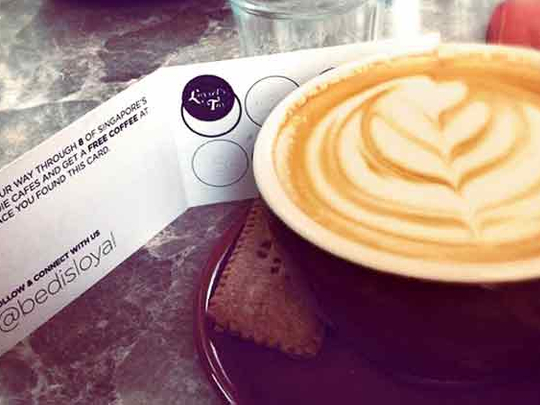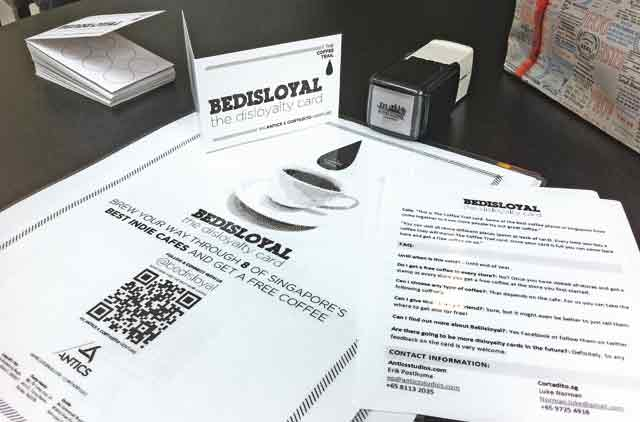
The introduction of disloyalty cards has given the concept of ‘customer loyalty' a new meaning. By reversing the idea of loyalty, several coffee shop owners in major cities around the world have landed a marketing success.
Disloyalty cards work basically in the same way as loyalty cards: customers get rewarded by using the services of certain food, drink, or entertainment outlets. However, in the case of disloyalty cards, they get points for visiting as many different venues as possible.
A coffee trail
In Singapore, the Be Disloyal card was thought up by coffee shop owners Erik Posthuma and Luke Norman and realised by Malaysian digital creative agency Antics in 2011, together with eight of the city-state's independent coffee shops. Customers were given a disloyalty card at any of the eight participating cafés. The card is stamped each time they purchase a coffee from one of the other seven cafés and, once the card is full, they return to the original café to receive their free coffee. The Be Disloyal card already has its own Facebook community and received a lot of attention from the local press.
The coffee trail expired at the end of 2011, but a new disloyalty card has been created with malted beverages. In an email interview with GN Focus, Norman says: "We set the Coffee Trail for three-and-a-half months to help create a sense of urgency for customers and media outlets. We wanted to encourage customers to visit a new café every week. The response from the cafés was great — many have asked for us to start another coffee trail."
Global plans
And the Disloyalty Card is set to travel all over the world, according to Norman. "We're very interested in helping customers in different cities discover local places that are passionate about selling great products — we're currently looking at a couple of locations outside of Singapore," he says. "Additionally, we're looking to create an app to help make it easier for customers to find new places and share their favourite trails."
Since its introduction in Singapore, the idea has spread. At the end of last year eight independently owned cafés have joined together to launch the first disloyalty card programme in Boston in the US. Having started on December 15, 2011, the eight cafés began distributing disloyalty cards to their customers, who received a stamp from each of the cafés when they purchased a drink. After the card has been completed, they could redeem it for a free drink at any of the participating cafés.
"It's similar to a customer loyalty card, except that customers are encouraged to visit other businesses. The idea is to build support for local, independent shops in a city dominated by national coffee chains," the group Disloyal Boston says in its blog www.disloyalboston.com.
The first-ever disloyalty card, however, was launched in London by Gwilym Davies, the 2009 World Barista Champion, in the same year. It has a simple concept: it is a kind of member card for participating outlets, in this case coffee shops, which provide a limited number of such cards to customers and encourages them to visit other shops. After customers have collected a certain amount of stamps on their card, they can return to one of the outlets to get a reward, for example a free coffee. Some concepts include a monthly draw as well.
As opposed to conventional loyalty cards, disloyalty cards do not intend to lure as many customers as possible into a single shop, but want to strengthen a specific niche market. Apart from the UK, the concept has been adapted in the US, Canada, Singapore, and Australia so far. The use of Davies's disloyalty card began and ended at his establishment, as opposed to the successor cards. He introduced it out of respect for the coffee community, while cards that were introduced later were more entrepreneurial — enabling independent groups of businesses to establish compelling differentiation in the face of chain competitors.
Customers seem to enjoy the choice they have and the experiential reward they get. Competing with large chain brands can be difficult for small businesses but teaming up with similar smaller companies can create stronger competition.
Similar programmes have since popped up in Seattle, San Francisco, Calgary, Toronto and Sydney, most of them receiving overwhelming support from customers and enthusiasm from shop owners.
Counterculture model
In Toronto, the first disloyalty scheme was launched in April 2012 by the newly-formed Toronto Coffee Conspiracy (TCC), a group of privately-owned coffee shops that embarked on the idea as a counterculture concept.
"The exciting thing about this current surge in the coffee industry is that it's run by a lot of young, passionate people," TCC member and coffee shop owner Matt Lee told the Globe and Mail, which possibly explains the group's preference for insurrectionist marketing tools such as disloyalty cards.
The Toronto disloyalty cards work a little differently from the other models. There are 500 cards per store, and after the coffee-shop round is done and the card used, it can be turned in for monthly draws.
Meanwhile, marketing experts are asking themselves if the concept is viable for other sectors within the service and retail industry.
Growing the market
"Marketing has the goal to strengthen the customer base of a business or product," says retail expert David Dorf in his blog on Retailwire.com. "At first sight, with disloyalty cards, the risk is that formerly loyal customers find a better product at the competitor's. But basically, the goal of such a card is to strengthen the market for a product and not the customer base of a single brand," he says.
Hence, disloyalty cards could be used for restaurants, entertainment venues, music outlets, bars, and shops that sell distinguished products — but not for high-priced brands and consumer goods.
"It's a great example of thinking in reverse," Dorf adds.
In an increasingly competitive world dominated by chain stores, owners of independent shops have a tough time eking out a livelihood out of their entrepreneurial businesses. This makes the disloyalty card movement appear like a David versus Goliath fight, against the big players.
— With inputs from Sangeetha Sagar, Staff Writer













